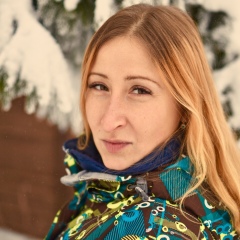»это очень навороченный и многослойный продукт.
как и сама реальность.
Как там это, бишь, у философов - бытие едино (=континуально), но при этом поделено на частности (=дискретно). Мне представляется, что поскольку бытие континуально, то набор составляющих его частностей бесконечен (ведь у континуума нет конца, на то он и континуум). Наше сознание - отражение реальности; однако оно отражает лишь конечный набор частностей, поскольку нельзя за конечное время (для нас это время жизни) провзаимодействовать с бесконечным числом частностей. Тем не менее, поскольку эти частности являются частью континуума, да и само сознание, будучи частью бытия, тоже является частью того же континуума, то оно является отражением и континуума тоже. Отсюда и наша способность к индукции, когда мы из дискретного конечного набора эмпирических данных можем делать обобщения, выходящие за рамки этого набора и позволяющие делать предсказания [пока еще] непознанного. Конечность набора элементов действительности, с которым взаимодействует индивид, обуславливает то, что мы называем "различиями нашего мышления", но вернее сказать - отражений реальности, существующих в каждом индивидуальном сознании. Более того, поскольку общее количество дискретных единиц реальности бесконечно, то вероятность существования двух индивидов, провзаимодействовавших с идентичными конечными наборами, равна примерно нулю (возможно, это можно доказать более четко, но мне пока не до того) (возможно, это сродни невозможности существования двух полностью идентичных квантов), а значит, не существует двух людей с идентичными картинами (отражениями) мира. Тем не менее, поскольку они все отражают один и тот же предмет - единое бытие - то общее у них у всех должно быть общее (прошу прощения за каламбур). За разными для всех частными картинами какбэ проступает единая, и это единое проявляется, когда мы начинаем двигаться мыслью в сторону обобщения. Сама способность делать обобщения является общей для всех (извините за слишком частый повтор).
Мышлением мы называем способность делать обобщения. Разумом у самих себя мы называем способность делать самые глобальные обобщения, касающиеся всего бытия. А поскольку бытие едино, то другого разума быть не может: чем ближе он к единому, тем он, так сказать, единее. Недопонимания у нас возникают не из-за того, что у нас разные мыслительные механизмы, а из-за того, что у нас разные наборы частностей из жизненного опыта. Усилия для того, чтоб понять друг друга, надо прилагать потому, что надо сопоставить и взаимодополнить частные картины мира, сиречь расширить свой опыт и ассимилировать новые данные. Но технических препятствий к этому нет, было б желание. Можно здесь вспомнить притчу о трех слепых мудрецах, которых попросили описать слона. Один схватился за хвост, другой за хобот, третий за ногу, и все описали слона по-разному, а потом подрались, доказывая каждый свою правоту. Ведь конфликт мудрецов произошел не от мышления, а от его отсутствия! От того, что они не попытались просуммировать свой опыт и поискать общие решения.
https://lkb-snegov.livejournal.com/115131.html
как и сама реальность.
Как там это, бишь, у философов - бытие едино (=континуально), но при этом поделено на частности (=дискретно). Мне представляется, что поскольку бытие континуально, то набор составляющих его частностей бесконечен (ведь у континуума нет конца, на то он и континуум). Наше сознание - отражение реальности; однако оно отражает лишь конечный набор частностей, поскольку нельзя за конечное время (для нас это время жизни) провзаимодействовать с бесконечным числом частностей. Тем не менее, поскольку эти частности являются частью континуума, да и само сознание, будучи частью бытия, тоже является частью того же континуума, то оно является отражением и континуума тоже. Отсюда и наша способность к индукции, когда мы из дискретного конечного набора эмпирических данных можем делать обобщения, выходящие за рамки этого набора и позволяющие делать предсказания [пока еще] непознанного. Конечность набора элементов действительности, с которым взаимодействует индивид, обуславливает то, что мы называем "различиями нашего мышления", но вернее сказать - отражений реальности, существующих в каждом индивидуальном сознании. Более того, поскольку общее количество дискретных единиц реальности бесконечно, то вероятность существования двух индивидов, провзаимодействовавших с идентичными конечными наборами, равна примерно нулю (возможно, это можно доказать более четко, но мне пока не до того) (возможно, это сродни невозможности существования двух полностью идентичных квантов), а значит, не существует двух людей с идентичными картинами (отражениями) мира. Тем не менее, поскольку они все отражают один и тот же предмет - единое бытие - то общее у них у всех должно быть общее (прошу прощения за каламбур). За разными для всех частными картинами какбэ проступает единая, и это единое проявляется, когда мы начинаем двигаться мыслью в сторону обобщения. Сама способность делать обобщения является общей для всех (извините за слишком частый повтор).
Мышлением мы называем способность делать обобщения. Разумом у самих себя мы называем способность делать самые глобальные обобщения, касающиеся всего бытия. А поскольку бытие едино, то другого разума быть не может: чем ближе он к единому, тем он, так сказать, единее. Недопонимания у нас возникают не из-за того, что у нас разные мыслительные механизмы, а из-за того, что у нас разные наборы частностей из жизненного опыта. Усилия для того, чтоб понять друг друга, надо прилагать потому, что надо сопоставить и взаимодополнить частные картины мира, сиречь расширить свой опыт и ассимилировать новые данные. Но технических препятствий к этому нет, было б желание. Можно здесь вспомнить притчу о трех слепых мудрецах, которых попросили описать слона. Один схватился за хвост, другой за хобот, третий за ногу, и все описали слона по-разному, а потом подрались, доказывая каждый свою правоту. Ведь конфликт мудрецов произошел не от мышления, а от его отсутствия! От того, что они не попытались просуммировать свой опыт и поискать общие решения.
https://lkb-snegov.livejournal.com/115131.html
This is a very sophisticated and multi-layered product.
like reality itself.
How is it there, I mean, among philosophers, being is one (= continual), but it is divided into particulars (= discretely). It seems to me that since being is continual, the set of its constituent parts is infinite (after all, the continuum has no end, which is why it is a continuum). Our consciousness is a reflection of reality; however, it reflects only a finite set of particulars, since it is impossible in a finite time (for us, this lifetime) to interact with an infinite number of particulars. However, since these particulars are part of the continuum, and consciousness itself, being a part of being, is also part of the same continuum, it is also a reflection of the continuum too. Hence our capacity for induction, when we can make generalizations from a discrete finite set of empirical data that go beyond this set and allow us to make predictions of the [yet] unknown. The finiteness of a set of elements of reality with which an individual interacts causes what we call “differences of our thinking,” or rather, reflections of reality that exist in each individual consciousness. Moreover, since the total number of discrete reality units is infinite, the probability of the existence of two individuals who interacted with identical finite sets is approximately zero (perhaps this can be more clearly shown, but I don’t have time for that) (perhaps this is akin to the impossibility of completely identical quanta), which means that there are no two people with identical pictures (reflections) of the world. However, since they all reflect the same subject - a single being - they all must have a common thing in common (I apologize for the pun). Behind the different for all private pictures of kakbe, the one appears, and this one manifests itself when we begin to move the thought towards generalization. The very ability to make generalizations is common to everyone (sorry for repeating too often).
Thinking we call the ability to make generalizations. By reason of our own selves we call the ability to make the most global generalizations concerning all being. And since being is one, there can be no other reason: the closer it is to the one, the more united it is, so to speak. Misunderstandings arise in us not because of the fact that we have different mental mechanisms, but because we have different sets of particulars from life experience. Efforts to understand each other should be made because it is necessary to compare and complement private pictures of the world, that is, to expand their experience and assimilate new data. But there are no technical obstacles to this, there would be a desire. Here you can recall the parable of the three blind wise men who were asked to describe the elephant. One grabbed the tail, the other for the trunk, the third for the leg, and they all described the elephant in different ways, and then they fought, proving each one was right. After all, the conflict of the wise men came not from thinking, but from its absence! From the fact that they did not try to sum up their experience and look for common solutions.
https://lkb-snegov.livejournal.com/115131.html
like reality itself.
How is it there, I mean, among philosophers, being is one (= continual), but it is divided into particulars (= discretely). It seems to me that since being is continual, the set of its constituent parts is infinite (after all, the continuum has no end, which is why it is a continuum). Our consciousness is a reflection of reality; however, it reflects only a finite set of particulars, since it is impossible in a finite time (for us, this lifetime) to interact with an infinite number of particulars. However, since these particulars are part of the continuum, and consciousness itself, being a part of being, is also part of the same continuum, it is also a reflection of the continuum too. Hence our capacity for induction, when we can make generalizations from a discrete finite set of empirical data that go beyond this set and allow us to make predictions of the [yet] unknown. The finiteness of a set of elements of reality with which an individual interacts causes what we call “differences of our thinking,” or rather, reflections of reality that exist in each individual consciousness. Moreover, since the total number of discrete reality units is infinite, the probability of the existence of two individuals who interacted with identical finite sets is approximately zero (perhaps this can be more clearly shown, but I don’t have time for that) (perhaps this is akin to the impossibility of completely identical quanta), which means that there are no two people with identical pictures (reflections) of the world. However, since they all reflect the same subject - a single being - they all must have a common thing in common (I apologize for the pun). Behind the different for all private pictures of kakbe, the one appears, and this one manifests itself when we begin to move the thought towards generalization. The very ability to make generalizations is common to everyone (sorry for repeating too often).
Thinking we call the ability to make generalizations. By reason of our own selves we call the ability to make the most global generalizations concerning all being. And since being is one, there can be no other reason: the closer it is to the one, the more united it is, so to speak. Misunderstandings arise in us not because of the fact that we have different mental mechanisms, but because we have different sets of particulars from life experience. Efforts to understand each other should be made because it is necessary to compare and complement private pictures of the world, that is, to expand their experience and assimilate new data. But there are no technical obstacles to this, there would be a desire. Here you can recall the parable of the three blind wise men who were asked to describe the elephant. One grabbed the tail, the other for the trunk, the third for the leg, and they all described the elephant in different ways, and then they fought, proving each one was right. After all, the conflict of the wise men came not from thinking, but from its absence! From the fact that they did not try to sum up their experience and look for common solutions.
https://lkb-snegov.livejournal.com/115131.html
У записи 1 лайков,
0 репостов,
68 просмотров.
0 репостов,
68 просмотров.
Эту запись оставил(а) на своей стене Сара Керриган




















